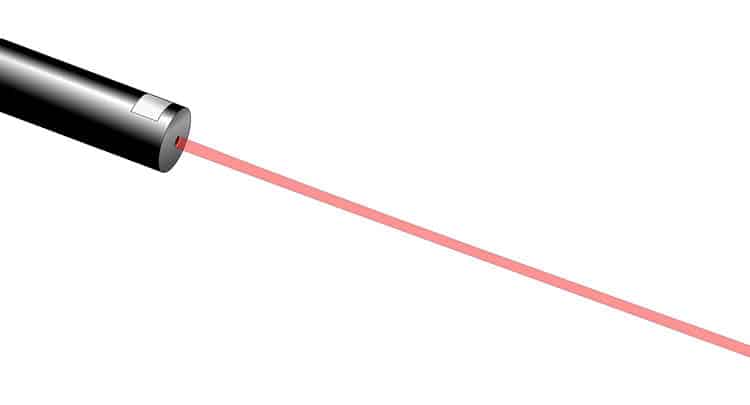Laser pointers are popular toys for cats because they give cats something to chase and provide a way for them to get exercise indoors. If you’ve used a laser pointer with your cat and you also have a dog, you may have noticed that your dog is also interested in chasing this little moving beam of light.
Unfortunately, what seems like an innocent way to play with your pets has a much different effect on dogs than it does on cats. Laser pointers are recommended play options for cats but not dogs.
This article will explain why you should not use laser pointers for dogs and what you can use instead to keep them entertained.
The Dangers of Laser Pointers for Dogs
When using a laser pointer near any animal, care should be taken to never shine the laser directly into their eyes. That narrow beam of light may potentially cause permanent eye damage.
The eyes contain photoreceptors that are sensitive to light. These cells give people and animals the ability to see and distinguish colors. When a laser pointer is directly pointed into the eye, it can damage these photoreceptors and permanently impair vision.
Beyond the risk of permanent physical damage, dogs can be psychologically damaged by the laser pointer. Cats can chase the light and then grow bored and eventually not care about it anymore. Even so, you should always give your cat a chance to “catch” the light. They should get a reward for their effort. You can lead them to a treat with the laser and then turn it off, signaling an end to the game.
When dogs see the laser, something else happens. They don’t view this as a game. They view the laser as prey, and their prey drive is triggered by the movement of the light. They can’t help but chase it, feeling compelled to do so. Not being able to ever catch that light is frustrating for the dog and can cause them to become hyper-focused and exhibit obsessive behavior, like staring at the last spot that the light was seen and not moving long after it has disappeared.
The dog never gets closure and can become frantic in searching for the light. Other flashes of light, like a piece of jewelry reflecting in the sunlight, can also make your dog highly reactive, and the obsession doesn’t end because the light is never “caught.” Dogs thrive on closure and being able to complete a job. Interestingly, bomb-sniffing dogs are also given a “win” sometimes so they stay happy and content doing their jobs.
If the dog receives no closure by catching the light, they can develop behavior problems. Not being able to ever capture their prey confuses and upsets them. They won’t eventually lose interest in it the same way that cats do.
View this post on Instagram
What to Do Instead
Use different toys instead to engage your dog, and leave the laser pointer for the cat. Dogs and cats get exercise in different ways. If you’re using a laser pointer to give your dog more exercise, consider throwing a ball or toy for them to chase instead. If your dog is bored, give them chew toys and interactive toy options to keep them entertained. Long-lasting treats and puzzle toys work well to keep your dog occupied without any psychological side effects.
Rope toys are fun ways to play with your dog without having to leave your chair. Play tug of war with them — but let them win sometimes so they feel satisfied at a job well done.
Final Thoughts
Laser pointers are bad for dogs both physically and psychologically. The light could burn cells in the eye, causing permanent vision impairment.
Dogs need to feel closure after playing with or chasing something in ways that cats don’t. A cat should be given the chance to “catch” the laser sometimes and get rewarded for their chase, but they will eventually move on from the light and resume their normal activities. Dogs will become focused on the light, not resting until they catch it.
Give your dog other toys to play with instead of a laser pointer to keep them happy, content, and satisfied.
Featured Image Credit: Pixabay














